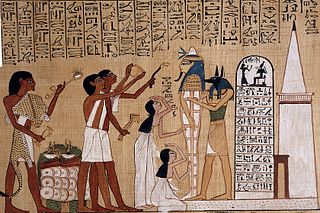
A funeral is a ceremony connected with the final disposition of a corpse, such as a burial or cremation, with the attendant observances. Funerary customs comprise the complex of beliefs and practices used by a culture to remember and respect the dead, from interment, to various monuments, prayers, and rituals undertaken in their honour. Customs vary between cultures and religious groups. Funerals have both normative and legal components. Common secular motivations for funerals include mourning the deceased, celebrating their life, and offering support and sympathy to the bereaved; additionally, funerals may have religious aspects that are intended to help the soul of the deceased reach the afterlife, resurrection or reincarnation.

Vienna is the capital, most populous city, and one of nine federal states of Austria. It is Austria's primate city, with just over two million inhabitants. Its larger metropolitan area has a population of nearly 2.9 million, representing nearly one-third of the country's population. Vienna is the cultural, economic, and political center of the country, the fifth-largest city by population in the European Union, and the most-populous of the cities on the Danube river.
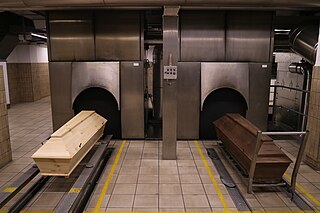
Cremation is a method of final disposition of a dead body through burning.
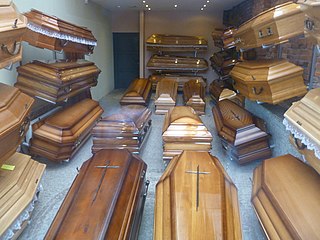
A coffin is a funerary box used for viewing or keeping a corpse, for either burial or cremation.

St. Stephen's Cathedral is an Catholic church in Vienna, Austria, and the mother church of the Archdiocese of Vienna. It is the seat of the Archbishop of Vienna, Christoph Schönborn.

The Vienna Central Cemetery is one of the largest cemeteries in the world by number of interred, and is the most well-known cemetery among Vienna's nearly 50 cemeteries. The cemetery's name is descriptive of its significance as Vienna's biggest cemetery, not of its geographic location, as it is not in the city center of the Austrian capital, but on the southern outskirts, in the outer city district of Simmering.
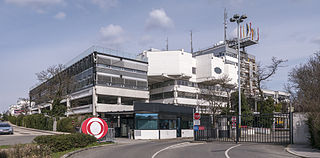
Österreichischer Rundfunk is an Austrian national public broadcaster. Funded from a combination of television licence fee revenue and limited on-air advertising, ORF is the dominant player in the Austrian broadcast media. Austria was the last country in continental Europe after Albania to allow nationwide private television broadcasting, although commercial TV channels from neighbouring Germany have been present in Austria on pay-TV and via terrestrial overspill since the 1980s.

After Abraham Lincoln was assassinated on April 14, 1865, a three-week series of events was held to mourn the death and memorialize the life of the 16th president of the United States. Funeral services, a procession, and a lying in state were first held in Washington, D.C., then a funeral train transported Lincoln's remains 1,654 miles (2,662 km) through seven states for burial in Springfield, Illinois. Never exceeding 20 mph, the train made several stops in principal cities and state capitals for processions, orations, and additional lyings in state. Many Americans viewed the train along the route and participated in associated ceremonies.

Repatriation is the return of a thing or person to its or their country of origin, respectively. The term may refer to non-human entities, such as converting a foreign currency into the currency of one's own country, as well as the return of military personnel to their place of origin following a war. It also applies to diplomatic envoys, international officials as well as expatriates and migrants in time of international crisis. For refugees, asylum seekers and illegal migrants, repatriation can mean either voluntary return or deportation.
Austrian car number plates are mandatory vehicle registration plates displaying the registration mark of motor vehicles in Austria. They are used to verify street legality, proof of a valid liability insurance and to identify and recognise the vehicle.
Austrian Airlines AG, often shortened to Austrian or AUA, is the flag carrier of Austria and a subsidiary of Lufthansa, the flag carrier of Germany. The airline is headquartered on the grounds of Vienna International Airport in Schwechat where it also maintains its hub. As of July 2016, the airline flew to six domestic and more than 120 international year-round and seasonal destinations in 55 countries and is a member of the Star Alliance.

Manner is a line of confectionery from the Austrian conglomerate Josef Manner & Comp AG. The corporation, founded in 1890, produces a wide assortment of confectionery products. These include wafers, long-life confectionery, chocolate-based confectionery, sweets, cocoa and a variety of seasonal products.
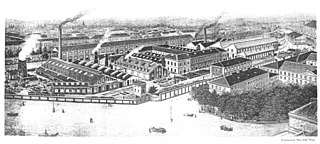
In 1839 the Lokomotivfabrik der StEG became the first Austrian locomotive works to be founded and it produced many influential locomotive designs.
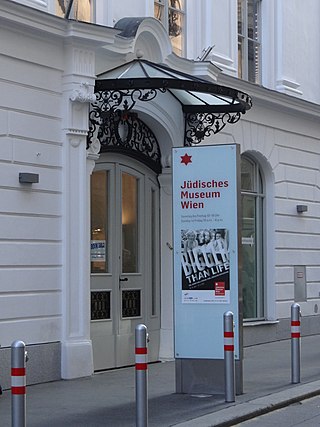
The Jüdisches Museum Wien, trading as Jüdisches Museum der Stadt Wien GmbH or the Jewish Museum Vienna, is a museum of Jewish history, life and religion in Austria. The museum is present on two locations, in the Palais Eskeles in the Dorotheergasse and in the Judenplatz, and has distinguished itself by a very active programme of exhibitions and outreach events highlighting the past and present of Jewish culture in Austria. The current director is Barbara Staudinger and the chief curator is Astrid Peterle.

The Jewish Community of Vienna is the body that represents Vienna's Orthodox Jewish community. Today, the IKG has around 10,000 members. Throughout history, it has represented almost all of Austria's Jews, whose numbers are sufficient to form communities in only a few other cities in Austria.
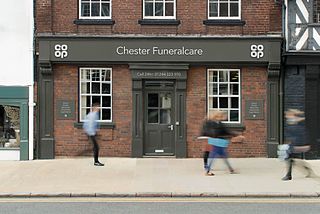
Funeral Services Limited, trading as Co-op Funeralcare, is a wholly owned subsidiary of The Co-operative Group, based in Manchester, which operates over 1,000 funeral homes and is the largest funeral director in the United Kingdom, accounting for 16.5% of the "at need" funeral market during 2016. Co-op Funeralcare is a member of the National Association of Funeral Directors and is also Funeral Planning Authority registered.
Rail Cargo Austria (RCA) is an Austrian rail freight transportation company with its headquarters in Vienna. It was founded on 1 January 2005 as an independent company from the freight transport division of the ÖBB Group.

The Bestattungsmuseum Wien is a museum in Vienna, Austria. With around 1,000 exhibits, the Vienna Funeral Museum gives a comprehensive overview of funeral customs, burial rites, funerary art and the special Viennese perspective on death and provides information on the historical and current funeral services in Vienna.

Vienna porcelain is the product of the Vienna Porcelain Manufactory, a porcelain manufacturer in Alsergrund in Vienna, Austria. It was founded in 1718 and continued until 1864.
Laura Anderson Barbata is a contemporary artist. Based in Brooklyn and Mexico City, Barbata's work uses art and performance to encourage social justice by documenting traditions and involving communities in her practice.















